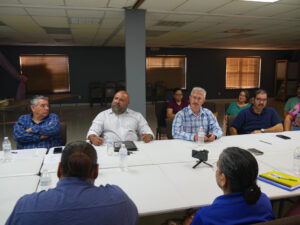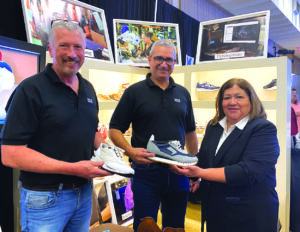By Karen Gleason
The 830 Times
Before witness testimony could begin in the murder trial of Clarissa Guerra, the judge in the case was asked to rule on the admissibility of an interview Guerra gave investigators and several jail phone calls between Guerra and inmates at the county jail.
Guerra, 25, stands accused of murder and evidence tampering in the shooting death of 27-year-old Del Rioan Sandra De La Cruz on March 7, 2021.
After the jury in the murder trial was selected and sworn in on Tuesday afternoon, the jurors were dismissed for the afternoon so Del Rio attorney Michael J. Bagley, who is representing Guerra, could ask 83rd Judicial District Judge Robert E. Cadena, who is presiding over the trial, for a hearing on his motion to suppress an interview of Guerra by Val Verde Sheriff’s Office investigators.
After the murder and following her arrest on an unrelated charge, Guerra spoke to VVSO Lt. Gina Garcia, who is the lead investigator in the case.
Bagley on Tuesday afternoon told Cadena he believed that Guerra was in emotional distress when she gave the interview.
At the start of the interview, Bagley said, Garcia had handed his client a photograph of Guerra’s brother lying in a hospital bed. Bagley said Guerra’s brother, who was in jail, had been assaulted, and Guerra was unaware of the assault until Garcia showed her the photo.
His client was “compelled, even threatened” to make the statement to investigators after being shown the photo, Bagley contended.
He acknowledged a short time later Garcia had gone over Guerra’s constitutional rights, advising Guerra she had the right to remain silent, the right to counsel and the right to stop the interview at any time.
“The question is, does she fully comprehend her rights?” Bagley asked.
District Attorney Suzanne West, who is presenting the state’s case against Guerra, defended the interview, emphasizing Garcia had advised Guerra of her constitutional rights and stating those rights had been properly administered before the interview began.
West called Garcia to the stand to answer questions about the interview.
Garcia testified she had interviewed Guerra on three different occasions after the murder of De La Cruz, with one of the interviews broken into two separate parts.
Garcia testified she had advised Guerra of her constitutional rights, and she said Guerra indicated she understood those rights, waived them and agreed to provide a statement.
“Did you coerce or threaten Ms. Guerra?” West asked.
“No,” Garcia replied.
“Did you promise the defendant anything in exchange for her statement?” West asked.
“No,” Garcia said.
“Did you deny her basic necessities during the interview?” West asked.
“No,” Garcia replied.
“Was the defendant under the influence of drugs or alcohol?” West asked.
“No,” Garcia replied.
“Was she too tired, sick or injured?” West asked.
“No,” Garcia replied.
West then played the video of the interview in question.
Before the interview begins, Garcia shows Guerra the photograph of the injured brother, and Guerra becomes visibly upset, wailing, crying and trying to cover her face with her shackled hands.
After Garcia proffers the Miranda warning, and Guerra agrees to waive her rights and speak to the investigator, Garcia asks, “Tell me what happened to Sandra (De La Cruz)?”
“He shot her. He shot her,” Guerra, still visibly upset, cries out.
“Who?” Garcia asks.
“(Ernesto) Olguin,” Guerra replies, naming her co-defendant in the murder case.
In cross-examining Garcia, Bagley asked her why she had shown Guerra the photo, and the investigator replied she knew that Guerra had communication with her brother at the jail.
“And you don’t believe (showing her that photo) is compelling her to give a statement?” Bagley asked.
“No,” Garcia replied.
After the two attorneys finished, Cadena said he would take the matter under advisement and rule on Wednesday morning.
On Wednesday morning, Cadena said he had reviewed the motion to suppress the video of the interview.
West once again argued that “mere emotional distress does not render the statement invalid” and again pointed out Guerra had been properly advised of her rights.
Bagley again argued the only purpose in showing the photo was to obtain a statement from Guerra and said a statement “made under compulsion or persuasion” must be found inadmissible.
Cadena ruled he found Guerra’s statement was “voluntarily made,” although he said he found Garcia’s presentation of the photo “odd.”
“I don’t find the interview was so overbearing that it overwhelmed her free will,” Cadena said in announcing his decision.
Cadena also allowed the use by the prosecution of several jail FaceTime and phone calls between Guerra and several inmates at the county jail.
—
Contact the author at delriomagnoliafan@gmail.com




